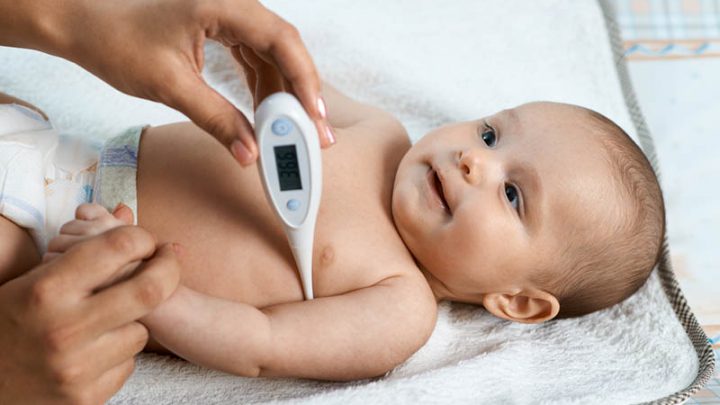If I’ve learned one thing so far, it’s the following: Being a parent consists of constant worrying and lots of laughing.
When you’re not laughing, you’re probably anxiously Googling things like: baby body hot but no fever.
Given that you’re here, you’re probably worried about exactly that and you fear for your little one’s health.
Allow me to calm your worried mind – if your baby’s body is hot but there’s no fever, there’s usually no reason for concern.
Your baby’s hot head and body can be a result of their thermoregulation system that’s still developing.
Actually, there are many factors that can influence your baby’s body to become hot without fever.
What you need to do is eliminate the factors discussed below before convincing yourself that there’s something more serious going on.
We’ll also talk about when you should see your baby’s doctor, so stay tuned, my worried parent!
What Is The Normal Temperature For A Baby?
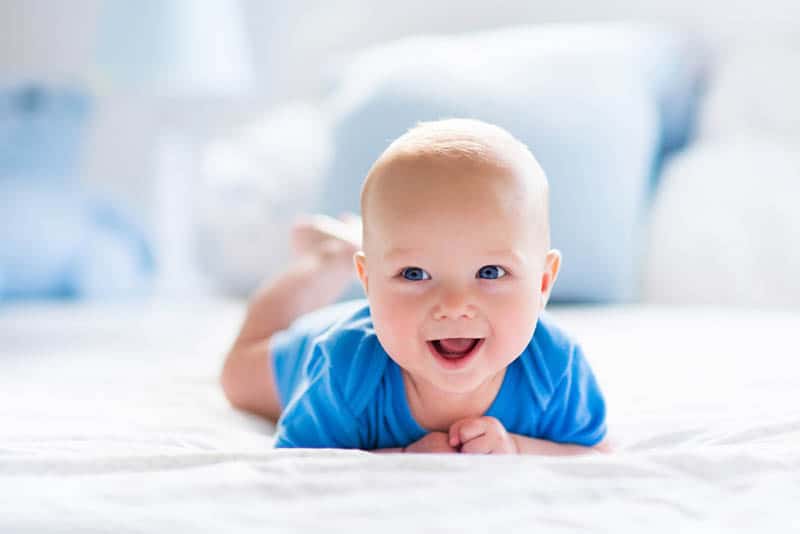
Before you enter the realm of extreme worries, the first thing you need to know is the normal body temperature of a baby.
According to the American Academy of Pediatrics (AAP), the normal body temperature of a healthy infant can fluctuate from 97 degrees Fahrenheit (36.1 degrees Celsius) to 100.4 degrees Fahrenheit (38 degrees Celsius).
It’s important to note that every baby has their own normal body temperature (meaning there are slight variations) and oftentimes the reason for your baby’s hot body is their developing thermoregulation system.
A baby is overheating or experiencing fever when their body temperature is around 100.4° F (38°C) or above.
Note that your baby’s temperature may vary during the day.
Baby Body Hot But No Fever – 5 Factors To Consider
1. Too many clothing layers
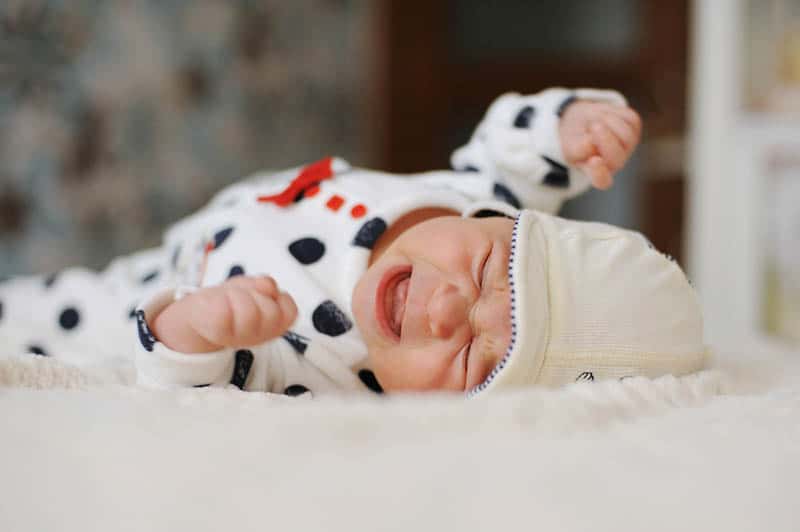
One of the most common reasons why young babies’ bodies are hot but there is no fever is because of too much clothing, especially layers of woolen material, lots of layers, and similar.
The reason for your baby’s body becoming warmer is that the clothing traps all the heat making her body hot without experiencing a fever.
As your baby’s body temperature increases, the heat tends to break free from her head which can lead to what is known as a “hot head”.
If this is the case with your little one, what you need to do is remove any unnecessary/extra layers of clothing and wait for your baby to cool down which should happen in around 15 to 20 minutes.
2. Teething
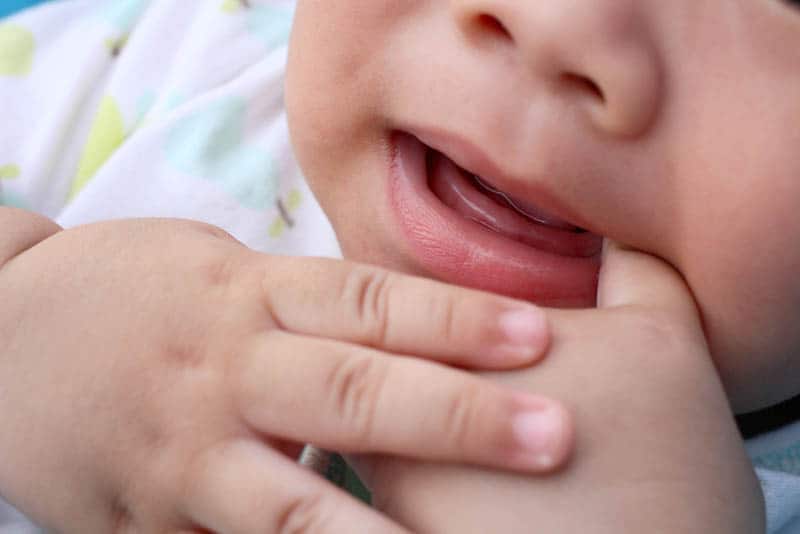
Teething can cause a wide variety of problems from fussiness to severe gum pain.
Because of that, your baby’s body temperature might rise but there will be no fever.
If your baby’s head seems hot and/or it is sweaty because she’s experiencing teething problems, try giving him/her a baby teether.
If you aren’t certain if your little one is teething or not, here are more symptoms to look out for:
• Your baby sucks her bottom lip
• Your baby smacks her lips
• Her cheek is flushed
• Rubs her ear
• Chews on things A LOT
• Your baby acts more fretful than usual
If your baby refuses a baby teether, another great remedy for teething is a cold washcloth.
3. Overexcitement
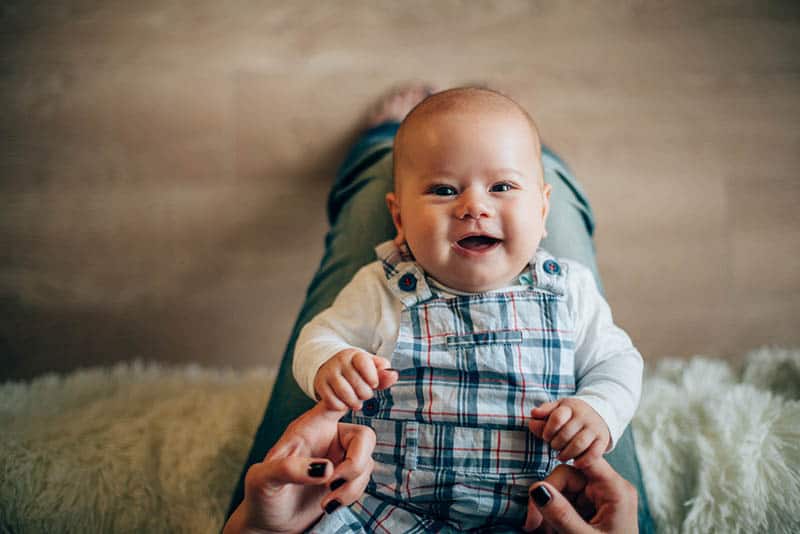
Baby body hot but no fever.
Hmm… Dear parents, perhaps the reason why your baby’s body is hot without fever is that your little one is overexcited.
And how couldn’t she be?
After all, everything your baby experiences is new for her, and sometimes all these new sensations can cause her to become overly excited (move around a lot) which may lead to a hot body and head.
When your baby moves around a lot, this raises blood circulation to the head.
This might offer some comfort if you’ve been wondering: Why is my baby’s head hot even though there’s no fever?
4. Hot weather
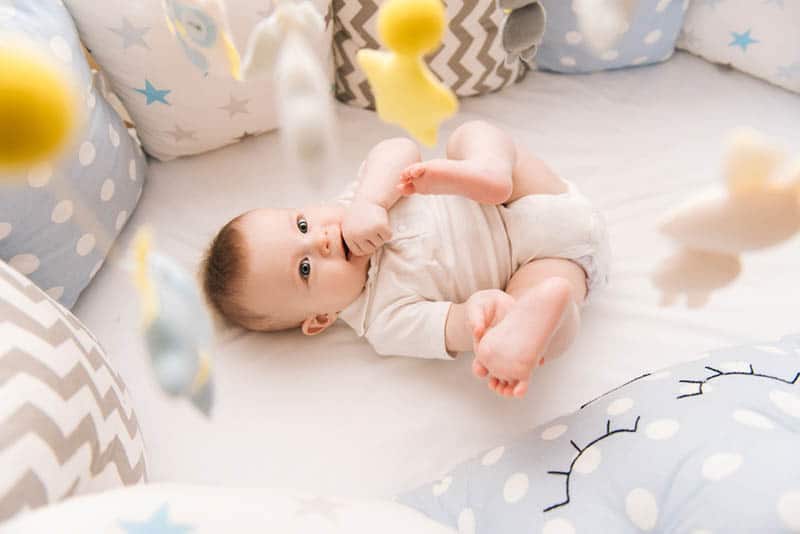
When the temperature rises outside, it’s normal for all of us to feel hot and babies are no exception.
When that happens, you need to keep your baby in the shade (out of the direct Sun) and make sure that there is enough airflow around her.
Apart from that, you also need to dress your baby accordingly.
Lightweight materials (such as linen, cotton) are the best bet during summer because, logically, they are lightweight meaning they allow our skin to breathe.
During summer, it’s common for a baby’s body to be hot without a fever and it’s nothing to worry about.
Note: Some babies tend to get a high temperature after they have had their vaccinations. This should resolve on its own.
5. Room is too hot
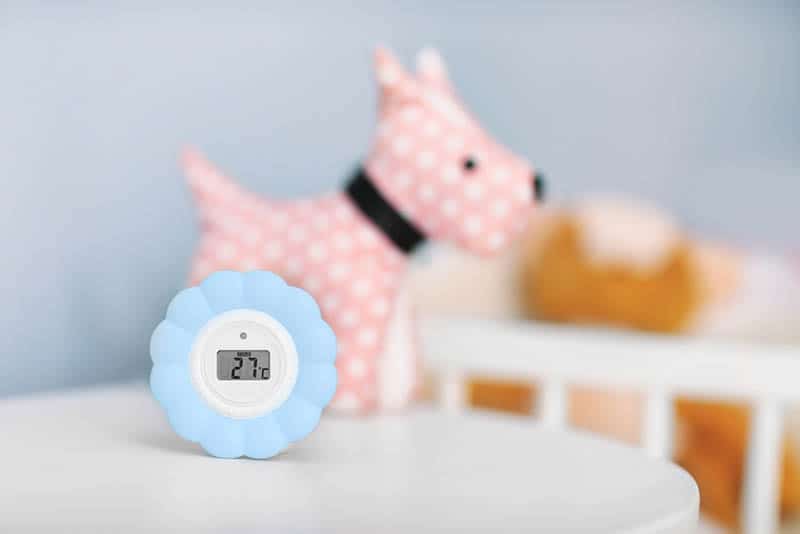
Baby body hot but no fever?
How about checking the room temperature?
Many parents forget to pay attention to the room’s temperature, only paying attention to the baby’s clothing.
Perhaps the room is too hot due to hot weather. If the room is too hot because of that, air conditioning is a good choice.
If you, for some reason, don’t have access to an air conditioner, you need to make sure that the room is ventilated and that your baby is dressed accordingly (in lightweight materials).
Helping a baby stay warm at night during the winter can be a real challenge.
If the room is too hot because it’s cold outside and you’re heating the house, adjust the temperature for your little one’s room (if applicable) and dress them for sleep properly.
Don’t keep the room temperature over 77 Fahrenheit (25 degrees Celsius) and choose room heaters that are safe for babies.
A room thermometer is a great gadget when it comes to adjusting the baby’s room temperature.
Warning Signs Your Baby Is Overheating
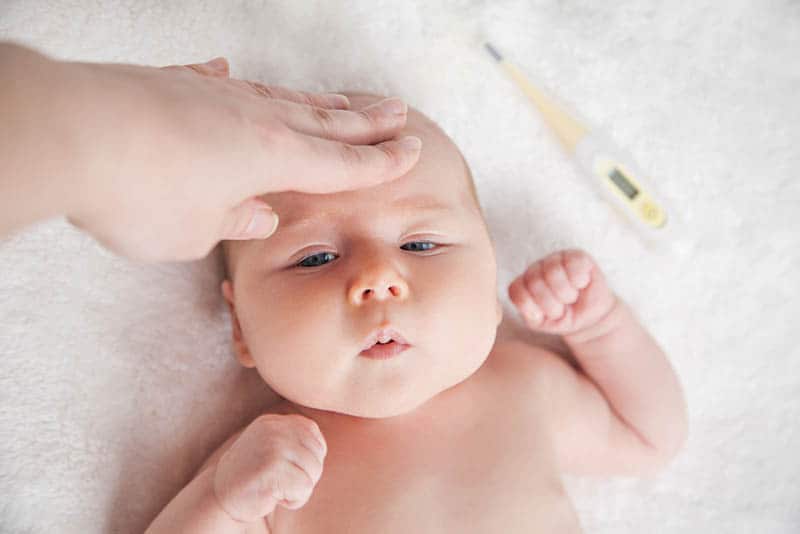
One of the ways to check if your baby is too hot is by touching her neck and ears.
If her neck is sweaty and her ears are red, this means your baby is too warm.
Remember that overheating increases the risk of Sudden Infant Death Syndrome (SIDS).
Red flags that your baby is overheating include:
• Your little one’s skin is red.
• Your baby feels warm to the touch.
• She has an accelerated heart rate.
• She has a fever but doesn’t sweat.
• She seems dizzy and acts confused.
• She doesn’t respond and acts lethargic.
• Vomiting.
Overheating Baby = Restless Baby
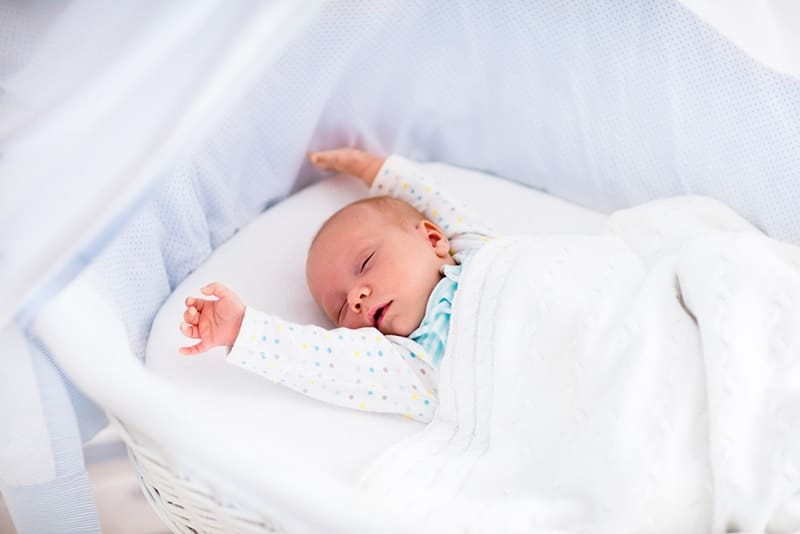
If your baby arches her back while sleeping, this might mean that she’s upset due to overheating.
Babies express themselves in so many different ways and your job as a parent is to learn them all (if possible).
If your baby feels too warm, chances are she’ll become restless which means less sleep.
If you want to avoid that, don’t add too many layers of clothing while putting your baby to sleep.
Also, don’t cover your baby’s head with hats while she’s sleeping.
This is a huge no-no because if you do that you’ll block the baby’s ability to use her head as a radiator.
Another reason is that hats can slip over a baby’s face during the night and cause difficulties breathing or God forbid, a choking hazard.
Another thing you shouldn’t use is blankets (especially electric blankets or those heating pads that you put under your baby).
These things can cause overheating and expose your baby to electromagnetic radiation.
If you’re not sure whether your baby is overheating or not, it’s always better to cool them off just to be on the safe side.
Are Babies Capable Of Regulating Their Temperature?
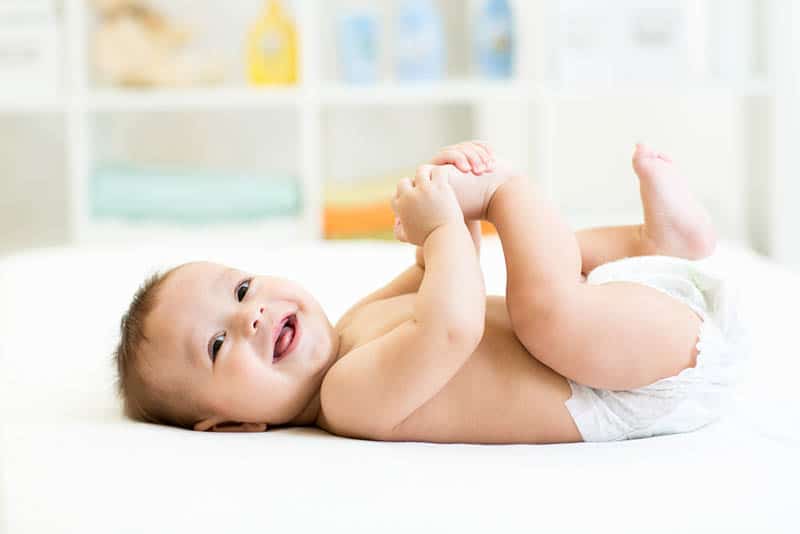
Even though babies’ little bodies are truly amazing and complex, they don’t have the ability to regulate their own temperature or adapt to the outside temperature that adults do.
Babies start to adjust their temperature between 18 months and 2 years of age.
If you’re wondering why this is so, the answer lies in their little brains.
Regulating your body temperature is something that occurs primarily in the brain.
To be more precise, the part of the brain which is responsible for it (hypothalamus) doesn’t function for a few months after the baby is born.
Another reason why they can’t regulate their body temperature is that the baby’s skin is still too thin (doesn’t have enough fatty tissue).
I bet that for many of you it’s now understandable that your baby’s body feels hot to the touch but there’s no fever.
When Should You See A Doctor?
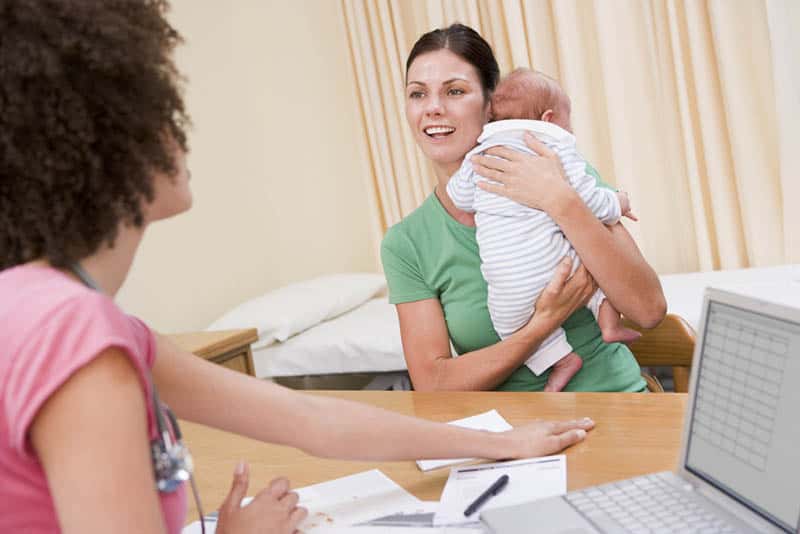
You should call a doctor if your baby has a high fever and one of the following symptoms:
• Your baby’s body temperature rises above 104°F.
• The baby is lethargic and unresponsive.
• The baby’s immune system is weakened (for some other reason).
• After taking antibiotics, the baby still doesn’t feel better (within a day or two).
• A fever continues for longer than 24 hours in a baby that is younger than 2 years old.
• There are visible signs of dehydration (dry tongue and mouth, sore throat, refusal to drink, vomiting, stiff neck).
• The baby is less than 3 months old.
• The fever is still present (even after medication).
You should go to the emergency room immediately if:
• Your infant is younger than 3 months.
• Your child’s temperature is 107 degrees Fahrenheit or higher.
• Your infant experiences a seizure (and this has never happened before).
• The seizure continues for more than 15 minutes.
(Unless told by your doctor, never give aspirin to a child because it is related to Reye syndrome which is a rare but potentially serious and fatal disease.)
Fever occurs when the body’s “thermostat” raises its temperature above what’s considered to be a normal level.
Even though all these fever conditions are every parent’s nightmare, keep in mind that having a fever indicates that your baby’s immune system is working.
If you notice that your baby is extra fussy and feeling uncomfortable, acetaminophen and ibuprofen are things you can give to her but make sure to follow the instructions on the package regarding weight and age.
Also, make sure to give your baby lots of liquids to prevent dehydration and if you’re breastfeeding your little one, give him a lot of feeding sessions.
You can give toddlers water, electrolyte solutions, diluted juice, soup, and similar.
Which Thermometer Should You Use For Your Baby?
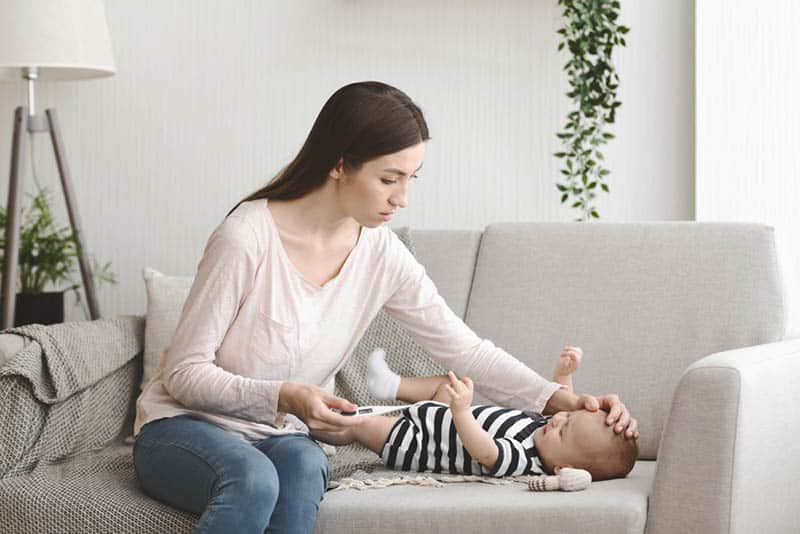
You can take your infant’s temperature with a digital thermometer.
If your baby is younger than three months old, you should use rectal thermometers instead.
They are the only thermometers that are recommended for babies who are younger than three months old.
The average rectal temperature is around 99.6 degrees Fahrenheit.
If it’s over 100.4 degrees Fahrenheit then you can call it a fever.
Another way of taking your baby’s temperature is under their armpit or in their mouth.
Note that this temperature-taking method is suitable only for babies of four months of age or older.
Conclusion
Whenever you notice your baby’s body is hot but there’s no fever, first check all the factors (teething, overexcitement…) and make adjustments if needed.
If your baby has a fever, it will probably soon pass.
But, if you notice that your baby is lethargic, looks dehydrated or if your baby is less than 3 months old, you should consult with your doctor or other healthcare providers.
Note: The information in this article is not an alternative to medical advice for your baby’s condition. It is only meant as general advice and information for educational purposes.
If you’re concerned about your child’s health, you should contact your doctor, pediatrician, or other adequate healthcare providers.
References:
• Wyckoff, A.S. (November 2009.) Thermometer Use 101. The American Academy of Pediatrics (AAP).
Like this post? Please share or pin it for later. You can also stay in the loop and follow us on Facebook, Instagram or Pinterest.
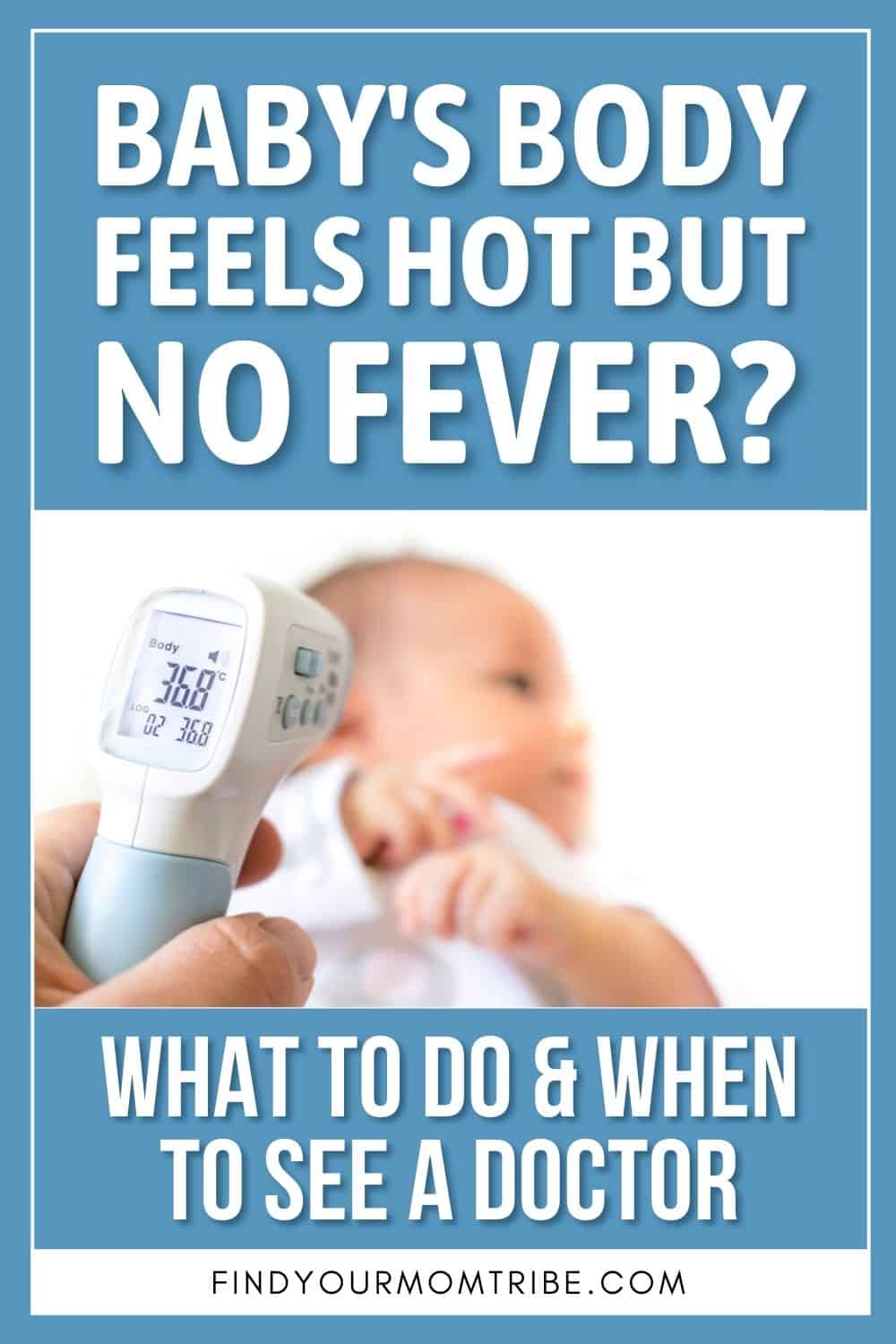
We love honesty! Find Your Mom Tribe is an Amazon Associate and we earn from qualifying purchases through affiliate links at no extra cost to you. Please see our full Amazon Affiliate disclosure for more information.

